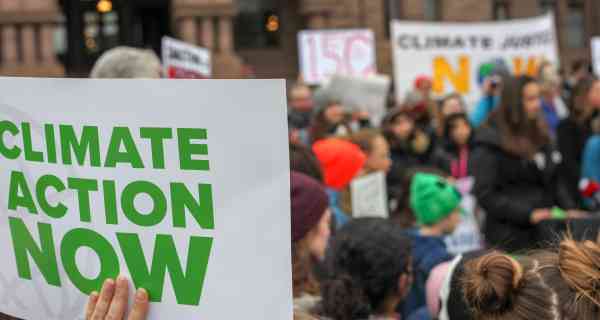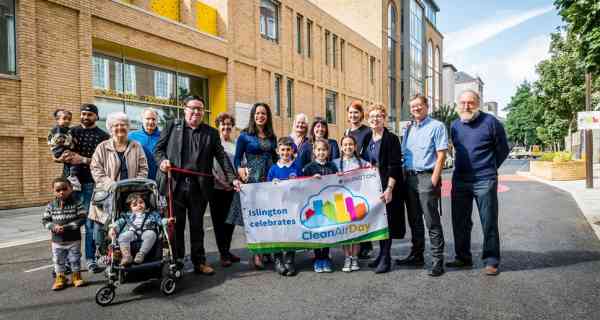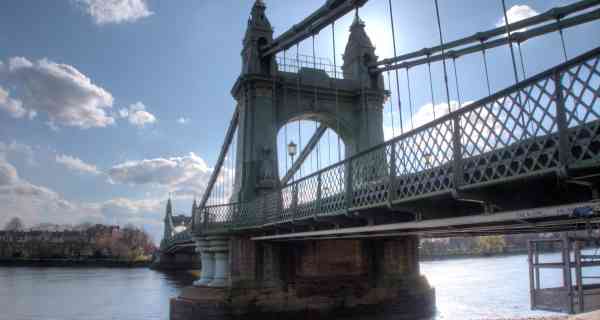GB Top 10: Clean air in the capital
Government Business shares research into the green efforts of all of the London Boroughs, including climate emergency declarations and carbon zero targets, to compile a list of the top performing councils in the area of climate action
In one of her last policy moves as Prime Minister, Theresa May announced that the UK will eradicate its net contribution to climate change by 2050. The Committee on Climate Change (CCC) has argued that current policies would have to be ramped up significantly for a ‘net-zero’ emissions target to be credible, with many councils across the country setting ambitious targets before the central government 2050 target.
London, like most regions, is keen to be central to this and, as such, has seen many boroughs vocalise their efforts and plans to be deemed ‘leading the way’. But, which authorities are actually driving transformation for the environment, who is blowing out a lot of smoke, and who is yet to join the changing scenery?
We revisit our Top 10 lists of a few years ago to celebrate those London Boroughs driving change and deserving plaudits for green ambition.
1 - Tower Hamlets
At the start of August, Tower Hamlets Council announced that it had achieved an 18 per cent reduction in its greenhouse gas emissions compared to last year, as its drive to become carbon neutral by 2025 continues to gather pace.
As of the start of October, no local authority in the country has set a more ambitious carbon zero target with Tower Hamlets announcing in May this year that it would seek to reduce emissions from the council to net zero by 2025. This followed a petition which, with 1,100 paper signatures and over 1,000 online, was one of the biggest ever presented to the borough.
To date the council has achieved a 58 per cent reduction in CO2 emissions, whilst progress has been tracked as part of a carbon management plan, which commits the council to a 60 per cent reduction in CO2 emissions by 2020, potentially saving more than £2 million in the process.
Some of the projects that are underway in the borough at present include: a phased programme to replace all of the street lighting in Tower Hamlets with high efficiency LED lighting, which could save the council £2.7 million by 2020; and providing grants to primary and secondary schools in the borough to spend on energy efficiency projects that will save each school an average of £5,400 in fuel costs annually, which can instead be directed into frontline educational services.
The borough, which claims to have the most traffic in the country with a third of all trips shorter than 1.2 miles, is also currently working on a transport strategy to support residents and visitors to travel more sustainably in the Tower Hamlets region and by doing so, help improve air quality, road safety and public health. Additionally, the council removed single use plastic cups in its buildings recently and instead has provided reusable coffee cups and plastic bottles to staff who have signed a ‘plastic free pledge’.
21 primary schools in Tower Hamlets are joining the first phase of an exciting new scheme to improve safety and air quality at school gates, improving the health of our youngest residents. The schools will be the backbone of the mayoral commitment to deliver a total of 50 ‘School Streets’ (streets with reduced air pollution levels) outside primary schools in the borough by 2022.

2 - Croydon
Making the borough more sustainable is a major priority for Croydon Council, with the authority setting out a raft of ambitious targets to make the council carbon neutral by 2030 back in July, as it declared a climate emergency in the region.
The authority’s commitment to tackling climate change was launched at Croydon’s first Sustainability Summit, where residents and school children discussed how to make the borough a greener place. Like Tower Hamlets, Croydon is one of the lead borough in London’s School Streets programme. After the idea received nearly 70 per cent positive feedback in a public consultation, eight new School Streets are likely to be introduced by the end of the year.
But the council also has longer term plans, including boosting the borough’s recycling rate by nine per cent, planting 3,500 trees by 2023, reducing energy use, installing 400 public charging points for electric vehicles by 2022 and making it easier to cycle and make other sustainable journeys across the borough, helped by £500,000 for new cycle lanes. On the last two points, residents’ annual parking permits were changed this month depending on how polluting their vehicle is, with the council offering substantial discounts for the greenest cars.
The successful Croydon Sustainable Summit also led to plans to set up a citizens’ assembly to help guide environmental work in the borough, with the assembly ensuring that residents have a way to directly shape how the council will tackle critical issues such as the climate and ecological emergency.
Elsewhere, Croydon has achieved a 48 per cent recycling rate – a nine per cent increase from this time last year – after major changes to household recycling and waste collections, and is also piloting a low-carbon, ground-source heat pump system to reduce council tenants’ bills while helping the environment.
3 - Islington
Islington Council is another borough to have declared a climate and environment emergency and pledged to work towards making the area net zero carbon by 2030. The council resolved unanimously in June to set the deadline, pledging to give the council the necessary resources and legal powers to achieve its ambition and embed the reduction of carbon emissions in all relevant council decision making.
Islington Council is on target to reduce carbon emissions in Islington from 2005 levels by at least 40 per cent by 2020, having converted all streetlights to LEDs, saving 28,280 tonnes of C02 over the 20-year lifespan of the bulb, and insulated cavity walls in council housing and buildings that has brought annual savings of 8,600 tonnes of C02. It is also one of a number of London boroughs to have installed a new generation of electric charging points in lampposts to help tackle air pollution and help drivers to switch to cleaner vehicles.
In the same month, the council launched a public consultation on its new five-year strategy to help people live more healthily by improving the borough’s air quality, and celebrated its 10th School Street – the pioneering initiative to cut pollution, boost road safety and encourage cycling and walking. Islington’s School Street Scheme reduces traffic outside schools at drop-off and pick-up, aiming to create quieter, safer, environments for children, with cleaner air.
Earlier in the year, Islington’s fleet of street-cleaning vehicles adopted a new Aquazura pavement washer, which simultaneously wets, soaps and scrubs dirty pavements and recovers and recycles the waste water. It is the first of its kind in the UK to meet low emission standards, and was introduced in preparation of the Mayor of London’s ULEZ in April.
The council, working together with North London Waste Authority, also recently launched its bid to create one of London’s first-ever Low Plastic Zones (LPZ) in Farringdon as part of bold action to help cut single-use plastic waste.

Hammersmith & Fulham Council also declared a climate emergency in July, with councillors pledging to cut CO2 emissions from the council’s activities to net zero by 2030.
During the Summer, the council announced the commissioning of a new cross-cutting Climate Emergency Unit to urgently tackle the environmental impact of all aspects of the council’s work. The climate emergency motion also asked councillors to agree to launch an independent, resident-led, climate change commission to publicly develop ground-breaking policies and support the council’s Climate Emergency Unit to tackle climate change.
A scheme to green the area under Hammersmith flyover was also completed during the Summer, including new ivy ‘green screens’, plants and bright artwork on the flyover’s grey concrete pillars to make walking and cycling in the town centre healthier and more pleasant. Additionally, a new freight hub enables businesses signed up to the scheme to get the final leg of their deliveries by an emissions-free cargo bike removing hundreds of polluting delivery van journeys from our roads.
Part of its bid to be the greenest borough in Britain, a programme to swap out the older, inefficient street light bulbs has halved energy costs and slashed Hammersmith & Fulham Council’s carbon use, with new LED street lights having produced a 56 per cent drop in energy costs for the council. According to the authority, almost 8,500 streetlight bulbs have been swapped over, with 150 more LEDs installed across the various estates.
Perhaps more news-worthy, Hammersmith & Fulham Council has continuously launched legal appeals to challenge plans to expand Heathrow airport. Alongside four other councils and Mayor of London Sadiq Khan, the councils says that the proposed move would ‘significantly increase noise, congestion and pollution across west London’, ignoring the climate emergency that such councils have been urged to tackle.

5 - Lewisham
In February 2019, the London Borough of Lewisham agreed a motion to declare a climate emergency and pledged new action to make the borough of Lewisham carbon neutral by 2030. Amongst the initiatives to help reduce emissions and meet that target, the council is delivering on our corporate strategy priority to maximise opportunities for energy efficiency in all council buildings and new developments, facilitating the development of a district heat network to deliver waste heat from a power station to heat homes and delivering a fuel poverty advice service for south east London.
Data from June, released by the Department of Business Energy and Industrial Strategy, showed that carbon dioxide emissions in Lewisham were down by 38 per cent since 2005, nearing the 44 per cent target by 2020 set from a 2005 baseline.
The council has also approved plans to launch a consultation to update parking policy across the borough for the first time in five years, with proposed changes including introducing banded resident parking permits, based on a vehicles CO2 emissions. Drivers who leave their car engines running while stationary will face a fine of up to £80 from next year, after councillors agreed to introduce a traffic management order.
This follows the launch of a new multi-million pound air quality monitoring supersite in Lewisham in June, which will allow researchers to gather long-term, intensive and high-quality data on the content of harmful urban air pollution. It is part of a £6 million investment by the Natural Environment Research Council into three new air quality supersites – the other two being in Birmingham and Manchester.
Local groups in the borough striving to cut their carbon emissions can also apply for a grant of up to £15,000 from the new Lewisham Community Energy Fund, as of September this year. The fund – a key part in the commitment to become carbon-neutral by 2030 – is offering grants to groups looking to generate renewable energy, to increase uptake of renewable energy sources or to cut fuel consumption by adapting equipment already in use.
6 - Ealing
Ealing Council declared a climate emergency in April, with council leader Julian Bell highlighting the efforts of Manchester and Bristol city councils as setting the target for Ealing.
Data shows that Ealing has the second highest recycling rates in London, with 40 new electric car charging points installed over the spring. A total of eight vehicles arrived at the start of February and are being used by council officers in parks and facilities management service areas, with each vehicle saving the council £3,600 in monthly rental costs over the three-year lease. The council has a fleet of 62 vehicles and are researching into appropriate electric vehicles to continue to align with the transport strategy.
With more than 100 on-street electric vehicle charging points now in place across the borough and more on their way, Ealing is also moving into a new more environmentally-friendly era with greener travel options for local people. The council’s newly appointed training provider, Cycling Instructor, is offering free cycle training sessions for anyone who lives, works or studies in Ealing, with the borough also having secured funding from Transport for London to incorporate a Healthy Streets approach in the area.
In June, Perivale Primary School was named as the 50th school to have a solar panel system installed through the School’s Energy Co-op scheme, the tenth school in Ealing to become part of the scheme, and the 12th in London. Additionally, Ealing Council has slashed its headquarters’ energy bills by more than a million pounds and the building has received its best ever energy efficiency certificate this Summer. The council has saved a total of £1.2million in reduced energy bills at the five-storey Perceval House building since 2012.
7 - Southwark
Southwark Council has been working to reduce its emissions for some time, cutting them by 37 per cent since 2010. Moving forward, it will join forces with everybody in the borough, to try and achieve carbon neutrality by 2030. Weeks after making the declaration in May, Southwark’s very first Climate Change Summit analysed how Southwark can work towards carbon neutrality, with ambitions plans mooted, including banning all cars from Southward, excluding dibbled and electric vehicles, and installing more green walls at schools and introduce plants to business environments.
Southwark is a low-lying borough next to the tidal Thames, meaning it is particularly vulnerable to the impact of the rising sea levels and flooding. As such, the council is taking steps to move council buildings energy supplies to 100 per cent renewables from 2020, achieving the best recycling rates in inner London, and sending less than two per cent of waste to landfill.
The council has also fitted 81 electric vehicle chargers in the last year and is set to take this number to 150, by 2020.
The London borough secured a £500,000 air quality grant from the Mayor’s Air Quality Fund, which the council matched, resulting in £1 million for projects designed to help reduce air pollution and make living and passing through the new Walworth Low Emission Neighbourhood, a greener, cleaner and safer experience.
8 - Merton
Merton Council has stepped up its commitment to combating carbon emissions and rising temperatures this year by declaring a climate emergency. Although, the council has committed to take a leadership role to achieve carbon neutrality for the whole of Merton by 2050, the authority has also pledged to make every effort to become a carbon neutral organisation by 2030.
The council’s actions will involve work to reduce and decarbonise the energy used in all its 340 buildings, transport and contracted out services. Merton council has been working to reduce its emissions for some time, cutting them by 35 per cent since 2009.
Merton, which currently has 101 publicly accessible electric fast chargers operating with another 36 expected to be installed by the end of 2019, is among the top boroughs in London for the installation of charge points for electric powered vehicles.
Recent research from Friends of the Earth found Merton Council to be ranked joint second in London and among the top authorities across the country for its climate change action. The environmental charity gave the London Borough a performance rating of 80 per cent for work in response to the climate change emergency, having assessed all councils in a number of categories including renewable energy, public transport, lift sharing, energy efficiency, waste recycling and tree cover.

9 - Redbridge
This year, Redbridge Council became the first London borough to offer residents wireless charging of electric cars, in a move designed to encourage wider use of electric vehicles to help reduce the levels of air pollution in the capital.
The innovative scheme works by installing a pad on the underside of an electric car that can be aligned with pads buried beneath the road surface, allowing cable free charging as electricity passes to the car via induction. Redbridge partnered with parts of Buckinghamshire and Milton Keynes to trial the scheme offering some residents the induction pads for free. Others will be able to access the use of car-club cars which will be fitted-out with induction pads.
The council unanimously declared a climate emergency in June, pledging to become carbon neutral by 2030, and zero carbon by 2050, resolving to produce a report on Redbridge’s impact on Climate with an appropriate action list to stop climate change.
This includes undertaking a green audit of council services, prioritising action to tackle air pollution caused by car emissions, in particular, around schools. On top of this, Redbridge hopes to reduce the emissions associated with waste collection and disposal by encouraging more reuse, minimising
waste and increasing opportunities for recycling, as well as eradicating single plastic use from council premises and promoting the eradication of single plastic use in Redbridge.
10 - Wandsworth
Wandsworth Council is also set to play its part in tackling climate change with the goal of being carbon neutral by 2030 and a zero-emission council by 2050.
Wandsworth has also taken a clear stand against the expansion of Heathrow - and the damaging effects of more noise and pollution that would bring – forming cross-party coalitions with other councils and environmental groups in that fight.
In recent years it has reduced waste and encouraged recycling, planting hundreds of trees every year and making council offices and depots more energy efficient. The borough’s on-street charging infrastructure was boosted in May as part of £400,000 project which means Wandsworth remains on course to meet its target of delivering up to 900 on-street charging points in total. The number of electric vehicles bought by people living in the borough has grown from 127 at the end of 2015 to nearer 800, as of May.
In July, Tooting was chosen to be one of 13 areas in London to take part in the second phase of the Clean Air Villages project, which aims to improve local air quality by reducing emissions from business deliveries and servicing. Meanwhile, the council has drawn up plans to create a new green open space in Tooting, complete with trees, shrubs, seating, a picnic area, bike parking and play equipment for younger residents. Wandsworth Council also recently announced plans to work with local schools, residents and parks friends’ groups to plant an extra 80 trees across the borough.
Watch this space, as we also prepre to reveal the 10 London Boroughs seen to be making the least effort in tackling the country's climate emergency...


